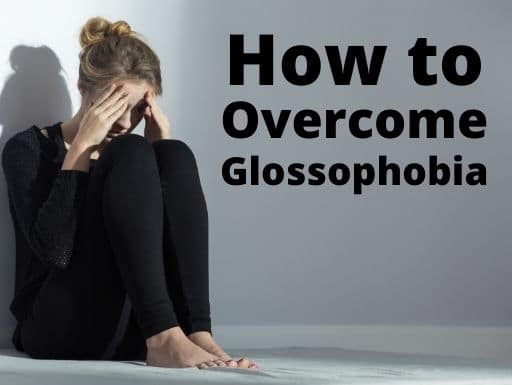
Glossophobia or the fear of public speaking is very common. I’ve been in the presentation skill industry for decades, now. In that time, I’ve come to realize that the statistics about this fear are confusing. Some studies say that as few as 7% of the population has glossophobia. Other surveys claim that over 95% of people experience this fear.
However, the statistics depend on the definition of Glossophobia that you are using.
You can see the actual public speaking fear statistics here.
What is the True Definition for Glossophobia?
Glossophobia Definition: The Fear of Public Speaking. (Traditional Definition.)
(Interestingly, there is no definition of this phobia in most dictionaries. The term comes mostly from psychology articles.) In these articles, the most common answer is simply, “Glossophobia Definition: The Fear of Public Speaking.”

However, if we use this definition, I would guess that almost 100% of the population have Glossophobia. The reason why is that even top professional speakers have a fear of speaking at times. For instance, I teach people how to reduce stage fright. However, a few years ago, I got nominated for a marketing award by an association of professional speakers. It was a great honor. To make the award fun, the conference organizer allowed each of the nominees to give a 12-minute presentation. Then, the group of over 300 speakers would choose the winner. It sounded like fun, so I accepted the invitation.
A week before the conference, I received a list of the other nominees. As I scanned the list, all of a sudden, it hit me that I was the only one on the list that specialized in helping people eliminate public speaking fear. As the day got closer and closer, I started getting more nervous. This could either be a huge career boost or a pretty dramatic setback. Since I typically don’t really get nervous before speeches anymore, this was really abnormal for me. I started to realize that if I go on stage and look even the least bit nervous, my career would pretty much be over. (That made me even more nervous.)
So, if we go by the definition above, I guess that I’m glossophobic.
Glossophobia: An irrational fear of public speaking that is difficult or impossible for the sufferer to control. (Better Definition.)
So, to get a true definition of Glossophobia, I had to understand the difference between normal fear and an actual phobia.
I like the definition used by Dr. Lisa Fritcher…
Fear is a normal and healthy part of life. In fact, fear plays an important role in keeping us from entering harmful situations and helping us decide when to get out of situations that are not necessarily the best.
Under normal circumstances, fear can be managed through reason and logic, does not take over our lives, or cause us to become irrational.
A phobia, however, twists the normal fear response into something that is persistent and difficult or impossible to control. (Read Dr. Fritcher’s entire article on fear or phobia here.)
So, if we use this definition of a phobia, then “the fear of public speaking” just doesn’t work. A better definition might be… “Glossophobia: An irrational fear of public speaking that is difficult or impossible for the sufferer to control“.
If you are going by this definition, the statistics about the number of suffers are going to much, much lower.
Regardless, though, whether you have a rational fear of public speaking or a full-blown phobia, the tips below will be very helpful.
How to Overcome Glossophobia (An Irrational Fear of Public Speaking)
Realize that some stage fright is both normal and natural.
Step one in reducing presentation jitters is to realize that public speaking, in and of itself, has fear built into the design. I typically spend a lot of the first hour in my presentation workshops getting my students to understand this. Think about any skill that you have learned that took more than a week to master. For instance, something like riding a bicycle, driving a car, skiing, firing a gun, learning to use a computer, and the like. All of these skills are things that you can practice in private with just you and a parent or coach. Public speaking is different, though. The first time that you practice this skill, you have an entire audience looking at you (and possibly judging you.)
Getting on a bike the first time and driving for the first time are both pretty nerve-racking as well. However, the first time you rode a bike, the entire elementary school probably wasn’t watching you. How nervous would you have been if that were the case? Also, the entire High School wasn’t watch you your first time behind the wheel either. Public speaking is an entirely different animal because when you do it, an audience is watching.
So that nervousness that you feel is pretty normal and natural. Don’t let it debilitate you.
If you can identify the CAUSE of the fear, it is much easier to overcome the fear.
One of the first things that our presentation instructors do when we consult with a client or start a presentation class is to try to get the client or student to identify the cause of the fear. Most often, the cause is just lack of experience. (For instance, if you only drive your car once every two years, you will likely be nervous every time you drive.) However, the following are things that we have heard that are more likely to cause a phobia versus a normal fear.

A Bad Prior Experience Speaking in Front of a Group Can Cause Glossophobia.
The most common situation that causes presentation fear is a bad past experience. Many of these situations occur when the person is asked to speak on a topic without any preparation. For instance, you might show up for a meeting and be put on the sot by a boss or coworker. If you feel like you didn’t perform well, you might be nervous the next time you attend a similar meeting.
In other cases, a person speaks successfully for years.,Then, out of the blue, something negative happens that destroys the person’s confidence. For instance, maybe a fairly negative audience consistently interrupts the speaker. And, ever interruption gets more and more difficult.
Once a speaker has a negative situation like this, the glossophobia can grow.

Low Self-Confidence/Self-Esteem.
Although most of us who experience this find it difficult to admit, this one is actually really common. Well-meaning parents, coworkers, or managers try to help the person by offering criticism. No matter how well the person performs, there is always room for improvement, and these holier-than-though critics will tell us.
This actually happened to me when I took a presentationclass in college. The instructor critiqued every presentation. I practiced a lot for the first presentation and got a 94%. The teaching assistant critiqued me after the presentation. As a result, when I practiced for the second presentation I focused more on the mistakes I had made in the first one. As a result, I got an 84% on that speech. Again, the instructor gave me an even more detailed critique afterward.
I got a 74% on my third and final speech. And after eight weeks of critical analysis I seemed to get worse with each presentation. I made a “B” in the class, but my confidence as a speaker dropped exponentially after the experience.

An Unresolved Trauma Can Cause Public Speaking Fear.
When a traumatic event occurs (especially at an early age,) the person experiencing the trauma can develop an unreasonable fear of the experience.
I once had a woman in my class who told me that she had avoided speaking in front of groups for over 40 years. She said that, when she was five years old, she was in a singing recital. Right in the middle of the song, her voice cracked. All the kids in the audience laughed at her.
She ran off the stage humiliated. That single traumatic experience haunted her for decades. She knew that her fear was unreasonable, but she couldn’t stop it. (Incidentally, she has spoken to audiences of thousands since she took my class over a decade ago!)

An Extreme Fear of Loss.
This fear occurs when we feel like we have a chance of losing something if we fail in the presentation. Perhaps the person is a manager and fears the loss of his/her job if he/she can’t command the audience. Or maybe you have to deliver a presentation to solidify the huge contract. In many cases, though, the speaker fears losing the respect of his/her colleagues.
For example, if a speaker has to deliver a presentation to a highly educated audience and has a fear of seeming “less educated” to them, the person may try to avoid the speech.
Although glossophobia can occur from a number of different causes, if the cause is similar to any of the above, then the presentation tips below can be a huge help!
A Few Simple Tips to Help You Eliminate Glossophobia
1) Start Small.
How do you eat an elephant? One bite at a time. If your fear is intense, there is no need to schedule a high-level presentation in front of 1000 people right away. Instead, start by speaking up more in staff meetings, at church, or join a social organization. Set a goal for each interaction. For instance, if you never speak up in staff-meeting, just set a goal to share a single idea with the group. Then, over time, increase the goal. Next week, add two ideas, etc.
2) Look for Opportunities to Present, and then Be Courageous.
You will never conquer any fear if you simply avoid the situations that cause the fear. Instead, look for opportunities to speak where the consequence of failure is pretty low. For instance, you can offer to speak at career day at your child’s school. (If you totally bomb this presentation, so what?) Then, be courageous. I talked in the article 7 Qualities of a Great Speaker about the difference between Self-Confidence and Poise. Self-confidence comes from having a series of successes doing something. Poise, however, is where a speaker is not confident but performs courageously anyway. The more of these courageous successes that you can string together, the more self-confident you will be.
3) Document What You Did Well.
The reason that our presentation skills classes work so well is that our instructors help each student document what they do well in each presentation. For instance, the instructor will teach the student a way to make part of his/her presentation easier, show the student how to do it, and then when the presenter succeeds, the instructor reinforces that success. You can do the same after each of your presentations as well. Immediately after presenting, make a list of some of the things that you did well in the speech. Turn off your internal critic for a while. (All of us are our own worst critic, so you will have to fight this.) Then, before your next presentation, refer to the items on your list. These lists will help you reduce the phobia and build confidence over time.
4) Practice in a Controlled Environment.
If you want a faster way to conquer glossophobia, join us in one of our fear of public speaking workshops. One of the great things about being in a controlled environment like a class or workshop is that the risk of failure is reduced to just about 0%. The only way to conquer glossophobia is to string together a series of successes that outweigh, in our minds, the causes that we talked about above. As each participant masters each part of a fantastic presentation, the fear is reduced exponentially. In fact, in many cases, the growth is so fast and so dramatic that the irrational fear is replaced by confidence. The process isn’t foolproof and it isn’t easy. However, it works almost 100% of the time!
For details about upcoming presentation skills seminars in your area, check out our schedule!

